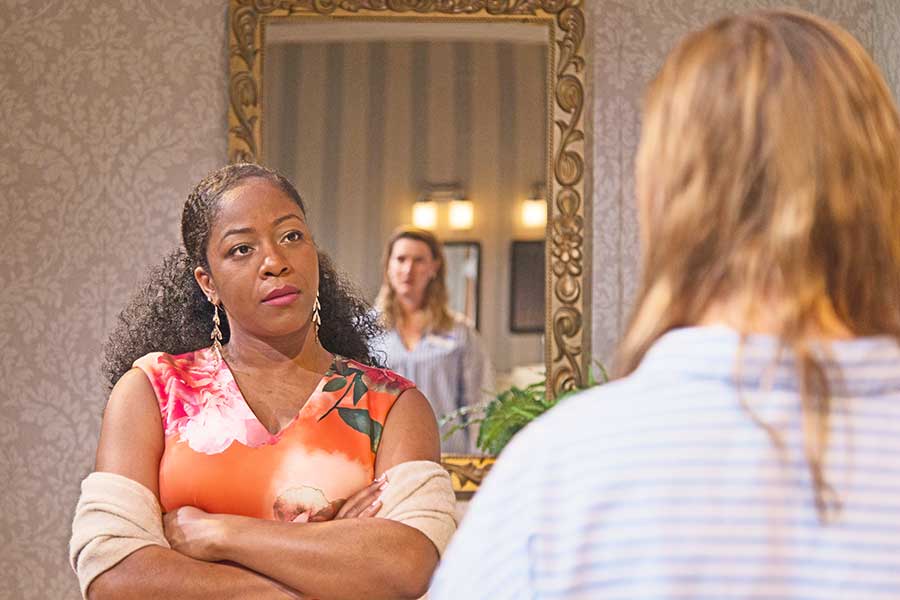“Mrs. Harrison” is out playwright R. Eric Thomas’ latest production with Azuka Theatre: a one-act dialogue between two women in a bathroom at their college reunion. Aisha is a successful black playwright, Holly a floundering white comic. Between them is a misremembered history.
Thomas, who won a Barrymore Award for Excellence in Theatre for his 2016 LGBTQ comedic-history play “Time Is On Our Side,” brings similar doses of laughs and storytelling to “Mrs. Harrison.” But with this script, he has steered away from LGBTQ life and turned his focus to women, race and the discussions that follow.
“I’m typically interested in writing about queer people, but Mrs. Harrison sort of showed up in my brain as this thing that didn’t involve any cisgender men, and it didn’t involve any overtly queer people or queer issues, but it still presented itself as a story I wanted to tell and I found that fascinating,” he said.
With only two characters, a small stage and 75 minutes to run with, “Mrs. Harrison” creates an intimacy between the crowd and cast, which, given the themes, can be uncomfortable.
“This play was written with the audience in mind,” said Thomas. “I knew that the people who came to see it would be predominantly white, and it’s a play that is very interested in talking about race. So, I was very interested in writing a play that was aware that it was being watched.”
Wise to the voyeurism or not, the audience was certainly responsive, throwing out laughs and snaps. One audience member was watching a little too closely, said Brandi Burgess, who plays Holly.
“Someone was leaning forward and was, like, in our stage light. And I thought, The audience is right here with us,”
Burgess said.
When the vocalizations weren’t laughs, they were groans at a backhanded comment, such as a microaggression from Holly to Aisha.
“Holly is never going to look like a racist on paper. But you see the appropriation in her comedy routines, you see some of the digs she makes about Aisha. A lot of those microaggressions are violent in this play. You feel the audience react to that,” said Burgess.
Rather than letting audiences off the hook, Thomas asks them to sit in their discomfort.
For Thomas, that means having to “reckon with Aisha.” The play doesn’t allow its audience to dismiss Aisha as an angry black woman; instead it asks viewers to look at her in her larger context: her history, her family’s history, her present.
“Aisha is so in control of that narrative for herself,” said Danielle Lenee, who plays the character. “She doesn’t allow the microaggressions to get to her. And then there’s a moment where she takes back her story; there’s a moment where she recognizes her power in her own story.”
The power of a personal history is an intrinsic part of Thomas’ work as a playwright, a journalist and the host of storytelling platform The Moth.
“So often we as LGBTQ people aren’t able to tell our own stories. We have policies that tell our stories for us, our stereotypes, our contexts we’re sort of just born into we have to live in,” said Thomas. “When I was working for the William Way LGBT Community Center and I would talk to LGBTQ seniors, they would share things that blew my mind about what life used to be like and what life is for them now. I realized that the most important thing that any individual can do is to tell their own story.”
In part, Thomas is telling his own story in “Mrs. Harrison,” calling Aisha the closest representation of himself he’s yet written.
As for the ending?
“The rest is up to you. I think everybody is going to come away with a different perspective of what happens, who they identify with and that’s really exciting to me,” said Thomas. “I wish I could be at every cocktail hour afterwards.”
Mrs. Harrison runs through May 20 at Louis Bluver Theatre at The Drake.
